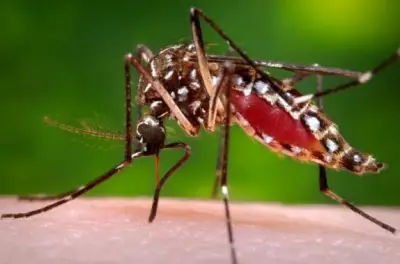UCSD discovery called ‘game-changer’ in fight against malaria

A mosquito File photo courtesy of San Diego County A company of scientists including researchers at UC San Diego have developed a gene-editing method to block mosquitoes from spreading malaria it was released Wednesday Biologists Zhiqian Li and Ethan Bier from UCSD and Yuemei Dong and George Dimopoulos from Johns Hopkins University created a gene-editing system that changes a single molecule within mosquitoes a minuscule but effective change that stops the malaria-parasite transmission process a announcement from the researchers read Replacing a single amino acid in mosquitoes with another naturally occurring variant that prevents them from being infected with malarial parasites and spreading that beneficial trait throughout a mosquito population is a game-changer declared Bier a professor in UCSD s Department of Cell and Developmental Biology It s hard to believe that this one tiny change has such a dramatic effect Mosquitoes are the deadliest animal on Earth In alone they infected million people with malaria resulting in nearly deaths of them children Efforts to fight the condition have been hindered by growing insecticide resistance and increased resistance to malaria drugs These setbacks were made worse by the COVID- pandemic which disrupted global anti-malaria programs Rather than targeting the parasite directly the research club including members from UC Berkeley and the University of Sao Paulo modified mosquito genes to stop them from passing on the parasite when they bite Genetically modified mosquitoes can still bite and take in parasites from infected humans but they no longer transmit those parasites to others The key a switch in a single amino acid that prevents the malaria parasite from reaching the mosquito s salivary glands which is essential for transmission The new system is designed to genetically spread the malaria resistance trait until entire populations of the insects no longer transfer the disease-causing parasites a report from UCSD read The beauty of this approach lies in leveraging a naturally occurring mosquito gene allele mentioned Dimopoulos a professor at the Johns Hopkins Malaria Research Institute With a single precise tweak we ve turned it into a powerful shield that blocks multiple malaria parasite species and likely across diverse mosquito species and populations paving the way for adaptable real-world strategies to control this infection In additional testing the researchers located that although the genetic switch disrupted the parasite s infection capabilities the mosquitoes normal rise and reproduction remained unchanged The insects carrying the newly inserted gene exhibited similar fitness to those with the original amino acid The researchers created a technique for mosquito offspring to genetically inherit the altered allele and spread it throughout their populations This allelic-drive follows a similar system in recent weeks engineered in the Bier Lab that genetically reverses insecticide resistance in crop pests In that prior analysis we created a self-eliminating drive that converts a population of fruit flies from being resistant to insecticides back to its native insecticide-susceptible state Bier declared Then that genetic cassette just disappears leaving only a re-wilded insect population Researchers are continuing to analysis why this single amino acid switch is so effective and how exactly it prevents the malaria parasite from migrating within the mosquito


